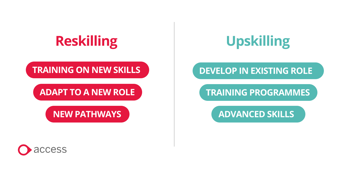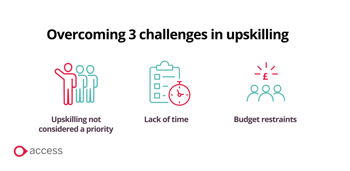 Access Learning
Access Learning
What is upskilling?
Upskilling means providing your existing employees with the opportunity to learn new skills and advance their careers at your organisation. In this article, we are going to answer the question ‘what is upskilling?’, look at the benefits to your workforce, and how to overcome three common upskilling challenges.
The importance of upskilling and reskilling employees
With many organisations looking to gain a competitive edge and ensure their workforce operates at its best, it’s no surprise that upskilling has become a vital tool. Making the most of the talent available and upskilling for internal career development and staff retention are key pillars in this initiative.
However, according to a survey carried out by PwC, only 40% of employees say their company is upskilling which suggests that more work needs to be done for both upskilling and reskilling employees.
What is reskilling and upskilling?
Now let’s differentiate between upskilling and reskilling. While they share similarities, they are ultimately different in their purpose and results. Upskilling focuses on acquiring additional skills in an existing field, while reskilling involves learning new skills for a different job or industry. Let’s explore both in more detail.
What is upskilling?
Upskilling is the process of acquiring new knowledge and skills to enhance job performance and career growth. It involves training and development initiatives designed to bridge skill gaps and prepare employees for future roles. Upskilling can focus on technical abilities, soft skills, or a combination of both. Recognising the importance of upskilling employees, many organisations have begun implementing these types of initiatives.
What is reskilling?
Reskilling is the process of equipping employees with new skills to prepare them for different roles within an organisation or even in a new industry. By providing targeted training, reskilling aims to enhance an individual's employability and ability to meet evolving demands in the workforce.
Organisations should carefully weigh the options of upskilling and reskilling employees, selecting appropriate times based on individual needs and addressing specific skills gaps within the business. The investment in these upskilling and reskilling initiatives can help to build an adaptable workforce that embraces learning new skills.

Why upskilling is important for employees
Upskilling your employees can offer many benefits, including enabling employee growth and giving them the opportunity to develop a new skill. This will help them to feel valued within the organisation and means they are less likely to look elsewhere for other opportunities. Let’s explore some key advantages of upskilling which enable employees to flourish in their roles.
1. Employees feel valued
When an organisation invests in reskilling and upskilling the workforce, employees understand their worth within the company and feel like they are truly part of the team and not just a cog in the machine. This in turn will boost morale and engagement which can have a positive impact on mental health in the workplace. A recent survey found that those who were supported at work were twice as likely to be happy and almost three and a half times more likely to be flourishing, so this investment in employee development not only enhances professional skills but also contributes to overall wellbeing.
2. Facilitates career advancement
For employees looking to advance their careers, upskilling can offer some great opportunities for professional development within an organisation. Equipping employees with the skills they need not only to thrive at their current level but also to help support them on their desired career paths with internal movement being key.
3. Personal development
In the Adult Participation in Learning Survey 2023, 25% of adults reported that participating in learning initiatives enhanced the skills crucial for their job, which in turn elevated their self-confidence. This shows that when engaging in targeted learning supported by their organisations such as utilising Individual Development Plans, employees will experience a boost in self-confidence and competence. Improving these skills will also help alleviate fears of job security, especially in times of financial crisis. This translates into heightened job satisfaction, as employees recognise their evolving capabilities and the value they bring to their roles.
4. Staying up to date with digital transformation
Upskilling is essential for staying abreast of digital transformation and reducing the digital skills gap. As Forbes emphasises, "upskilling entails learning new skills, but it also involves a cultural shift and change management. To be competitive in the digital age, individuals and corporations require a learning-for-life mindset, collaboration—with humans and machines - and a willingness to embrace new ways of doing things." A proactive commitment to continuous learning, collaboration, and adaptability ensures individuals remain agile and are not left behind while digital transformation - and the skills that come with it - continue to evolve.

All too often we find employers doing the bare minimum with staff development and simply hoping their employees will choose to stay for the long-term. Smart businesses see the value of investing in people across all levels of their organisation, making them feel valued and supporting them to be the best they can be at each stage of their career.
Benefits of upskilling for organisations
There are many advantages of upskilling that can bring about positive change to an organisation. Let’s look at five benefits of upskilling employees that organisations can leverage.

Looking to create an effective upskilling strategy?
Overcoming 3 challenges in upskilling
While there are many benefits of upskilling for employees and organisations alike, it’s not always easy to implement upskilling in the workplace. Let’s explore three obstacles commonly encountered when addressing reskilling and upskilling the workforce:
1. Upskilling not considered a priority
Organisations can struggle to prioritise upskilling when there are other demands that may require immediate action; short-term business pressures often overshadow the long-term benefits of developing the workforce. According to the 2023 Learning at Work survey, lack of learner time, engagement and budget are seen as the main barriers for L&D when supporting organisational and people goals. Ensuring that decision-makers within your organisation value the importance of upskilling employees will help with prioritisation.
2. Lack of time
Time constraints are a significant barrier to upskilling and reskilling the workforce– often learners aren’t able to fit upskilling into their busy schedules. Balancing work responsibilities with personal commitments can make it challenging for employees to dedicate sufficient time to develop new skills and knowledge . By introducing bitesize mobile learning content and gamification elements through a Learning Management System which offers engaging training and eLearning, employees can fit in upskilling and reskilling around their daily routines.
3. Budget restraints
Limited financial resources can hinder important upskilling initiatives as investing in employee development often competes with other business priorities. However, neglecting upskilling can lead to higher turnover, decreased productivity, and a competitive disadvantage. By showcasing why upskilling is important for employees in terms of their personal growth and how it will benefit the company, you can build a strong business case for allocating the necessary funds.

Getting upskilling right with Access Learning
Getting upskilling right with Access Learning
When your organisation prioritises it, you will reap the benefits of upskilling employees and see how it can empower your workforce. With the help of our Digital Learning products, you can identify and close skills gaps with ease.
Explore our Digital Learning Solutions today!
There are many ways to find out more about Access Learning and how it can transform learning, development and compliance in your business.

Speak to an expert
Chat with one of our learning experts and find out how Access Learning can be tailored to meet the needs of your business, regardless of size.

Struggling to track learning?
Our Learning management system (LMS) can help manage, assign and track training across your organisation.

View our eLearning library
Explore our extensive eLearning library, written by experts and designed to enhance the learning requirements of your organisation.

 AU & NZ
AU & NZ
 SG
SG
 MY
MY
 US
US
 IE
IE


